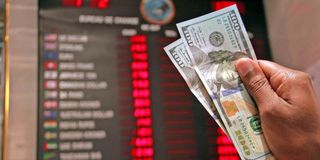Banks’ forex income picnic extends over shilling woes

Kenya’s top banks have more than doubled their foreign exchange trading income in the quarter to March amid high demand for foreign currency especially from importers.
Kenya’s top banks have more than doubled their foreign exchange trading income in the quarter to March amid high demand for foreign currency especially from importers—extending a run of gains from a persistently wobbly shilling against the greenback since last year.
An analysis of earnings of six out of the nine tier-1 banks that have released their financials for the first quarter to March shows that their income from trading foreign currency more than doubled to Sh18 billion in the three months compared to Sh8.9 billion in a similar period of last year.
Equity Group emerged as the biggest winner after its forex trading income grew by 152 per cent to Sh5.1 billion from Sh2.04 billion in the same period last year. Stanbic Bank came in second after its foreign exchange trading income jumped 148 percent from Sh1.71 billion to Sh4.25 billion this year.
Standard Chartered Bank recorded a similarly significant jump with its income from forex trading rising by 114 per cent to Sh2.18 billion from Sh1.02 billion.
Meanwhile, NCBA earned Sh2.6 billion from trading forex an increase of 64 per cent from last year while Cooperative Bank and KCB earned Sh1.1 billion and Sh2.6 billion respectively-- an increase of 44 per cent and 52 per cent respectively from last year.
The earnings reflect the booming forex trading business for commercial banks and forex bureaus amid a shortage of US dollars at a time demand has risen sharply. The shilling yesterday traded at 138.33 units against the dollar compared to 123.43 at the start of this year—marking 12.07 per cent drop since January 3, 2023, alone.
The huge forex earnings by banks were propelled by an increase in the traded forex volumes as well as a higher spread as lenders priced dollars higher due to the demand.
Import prices of essential goods such as petroleum products, wheat, edible oil, steel, and paper have shot up substantially on Covid-induced disruptions in global supply chains, which were exacerbated by the Russia’s invasion of Ukraine.
Manufacturers had complained last year that a shortage of greenback was forcing them to buy the US currency at a premium to the official Central Bank of Kenya’s (CBK) average exchange rate.
Kenya is banking on the government-to-government fuel import deal to ease pressure on demand for forex.
Kenya this year handed Abu Dhabi National Oil Company (ADNOC), Saudi Aramco, and Emirates National Oil Company (ENOC) a contract to supply the country with fuel for nine months with a grace period of six months to pay for the cargo.





